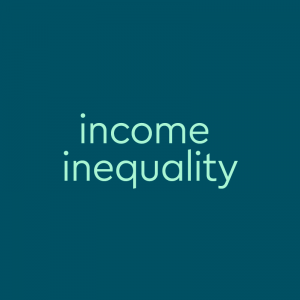Historical & Current Events dictionary
income inequality
[ in-kuhm in-i-kwol-i-tee]
What does income inequality mean?
The term income inequality refers to a state of unequal levels of income among members of different groups, such as between individuals in a particular country or between different countries.
Income is the money that a person adds to the money they already have—often primarily through wages paid by their employer, but also in other ways, such as investments.
Income inequality statistics often compare the lowest and highest income brackets. This is often presented by giving a percentage of a population and stating what portion of the overall income is earned by that percentage.
For example, according to US Census data from 2019, the wealthiest 20% of Americans accounted for about 52% of all income earned in the US (with the wealthiest 5% earning 23% of all income at the time). This means that in 2019, 80% of all Americans earned only about 48% of all income in the US.
There are a few terms that sound similar to income inequality but that are used in distinct ways.
The term wealth inequality is often broader and uses wealth to refer to the entirety of a person’s monetary assets (all the money they have), not just their income (which can be thought of as the money that a person adds to their existing wealth).
The terms wage gap and pay gap typically refer to the differences in the average pay of individuals who do the same job. For example, in the US, many studies show a wage gap between men and women, with women earning less for the same roles (and women of color often earning even less).
Wage gaps can be thought of as one factor that contributes to income inequality (which in turn contributes to wealth inequality), but income inequality is thought to be driven by many causes (which are discussed below).
The term income inequality is often used to imply that different people’s levels of income are not just unequal but unfair due to being the result of systemic factors. For this reason, it’s a term usually used by people who believe that income inequality is a problem (and a widespread and increasing one).
Example: Reports repeatedly show that income inequality has continued to increase, with the top earners earning more and more and the lowest earners continuing to earn the same. In other words, the rich are getting richer while the poor stay poor.
Where does income inequality come from?

The term income inequality has been used since at least the 1960s. In recent years, use of the term has become more widespread as income inequality has become a more mainstream political issue.
Many organizations have reported statistics showing that income inequality has increased globally as well as within certain countries and populations. In the US, statistics show that income inequality has significantly worsened over the past several decades, with a gap larger than most other countries.
Along with the gap between the highest and lowest earners (cited above), 2019 statistics compiled by the US Census Bureau also show large gaps in average yearly income among several different groups and categories, including:
- Unmarried men ($48,496) and Unmarried women ($34,612);
- City/Metropolitan households ($71,961) and Other households ($52,100); and
- Asian households ($98,174), White households ($72,204), Hispanic households ($56,113), and Black households ($45,438).
Some economists and other observers state that income inequality is (at least partially) a natural result of the economic conditions created by free trade. However, many others argue that the greater level of income inequality seen in the US and other countries is due to systemic factors that unfairly widen the gaps in the incomes of different groups. Some activists and politicians have proposed or called for policies aimed at lessening income inequality by addressing such factors, including racism, misogyny, political corruption, unequal political power based on wealth or social class, and unequal tax burdens on the rich and the poor.
Examples of income inequality
Who uses income inequality?
The term income inequality is often used by those who believe it is a widespread problem that results from systemic factors. It has become a frequent topic in US politics that’s often discussed alongside similar issues, including wealth inequality and wage gaps.
Economic slumps are inevitable, writes Scott Martelle, but the pandemic demonstrated the dire impact of growing income inequality.
Here’s why he believes our economy must provide for the vulnerable as it recovers.https://t.co/8HjPg1cnnD
— Los Angeles Times (@latimes) June 6, 2021
Keeping workers employed during the worst phase of a crisis can reduce income inequality. Ramping up job reallocation efforts during the recovery can further bend the inequality curve over the medium term. Read more in our latest #IMFBlog: https://t.co/kuG5WWJstq pic.twitter.com/Jql70NRC96
— IMF (@IMFNews) June 5, 2021
The investigation my colleagues kicked off today makes concrete something that economists have understood and debated for years: Wealth inequality has actually increased much more than income inequality, and the tax system isn't doing much about it. 1/ https://t.co/Y6F1r7o41o
— Lydia DePillis (@lydiadepillis) June 8, 2021
Note
This is not meant to be a formal definition of income inequality like most terms we define on Dictionary.com, but is rather an informal word summary that hopefully touches upon the key aspects of the meaning and usage of income inequality that will help our users expand their word mastery.